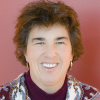Clergy learn about boundaries and social media
By Melissa Lauber
UMConnection Staff

From full-time Elders with decades of pastoral service to new Certified Lay Ministers, 11 categories of clergy lead the 85 churches of the Cumberland-Hagerstown District. The diversity of their gifts and qualifications is intensely broad.
But how many of them would “friend” you on Facebook?
On March 7, the pastors gathered at Hancock UMC for a continuing education event where they explored how the act of befriending had less to do with knowledge of social media and more to do with ideas about ethics and clergy boundaries.
Led by Sondra Wheeler, a professor of Christian ethics at Wesley Theological Seminary in Washington, D.C., the group considered how the priesthood is the world’s oldest profession, followed by medicine and law. These original professions, Wheeler said, make commitments to forms of human wholeness and well-being — pastors to salvation, doctors to bodily health, and lawyers to justice. With these commitments comes
Pastors are entrusted with power through a calling to the service of others, Wheeler said, which obligates them to be committed to the moral well-being of others. Even then it can be personally costly. To ensure this power isn’t abused, professional boundaries are established that define the practice of ministry.
But these boundaries are not about transgression or barriers not to cross, like on a soccer field, Wheeler said. Rather, they mark a space that allows space for congregants to be vulnerable.
“The whole reason for professions is that people need forms of care they cannot provide for themselves,” Wheeler told the clergy. “Boundaries are not to keep you out of court. They mark off the spaces in which profound risks can be taken and they mark those spaces as inviolate.”
Co-mingled in the discussion of boundaries were thoughts about power. Wheeler used principles of physics to describe it. Power, she said, is “simply the capacity to have an effect in the physical world.”
To fulfill their calling to proclaim the Gospel and make it visible, clergy must recognize their power and their boundaries.
However, in today’s world, many pastors have multi-layered relationships with those in their congregations. They share meals, conversations at Starbucks, are present at special
Drawing on the works of the philosopher Aristotle, the pastors defined friendship as being voluntary, between equals, reciprocal, dependent on mutual disclosure and involving mutual care-taking.
Friendship, in this model, they said, “can be the pinnacle of human relationships. Friends are the other half of one’s self. A friend is the one to whom you open your soul.”
In
However, in today’s culture, maintaining these boundaries and avoiding friendships is not always easy. On Facebook, people are invited to share with one another as “friends.”
To be relevant the church must be present in social media. However, for pastors to keep a strict professional distance on Facebook and other social media platforms is not easy.
Consider vacation photos or the sharing of personal thoughts, Wheeler said. “Posting on Facebook is like posting on the bulletin board in the narthex.”
Even subdividing one’s presence and only allowing certain people access to parts of one’s page can raise concerns.
“Pastors,” the Cumberland-Hagerstown clergy concluded, “should offer devoted personal service, but not friendship.”
“Unfriending” people when one moves to a new appointment so that the authority of the new pastor is not challenged can also cause difficult issues, the pastors said.
“We’re not here to find all the answers this morning,” said the Rev. Susan Boehl, who chairs the district’s committee on ministry, which sponsored the Boundaries and Social Media discussion. “But we’re learning and having
The Rev. Conrad Link, District Superintendent, said he strongly believes in the importance of continuing education. It is one of the strengths of his district and the clergy gather regularly to learn, share ideas and resources and network with one another.

